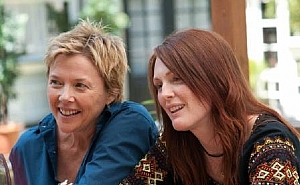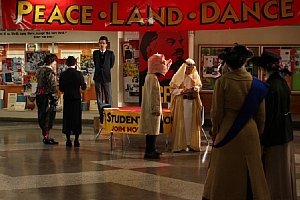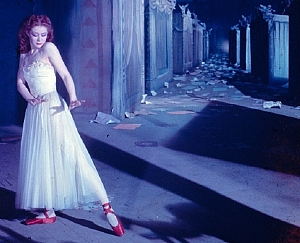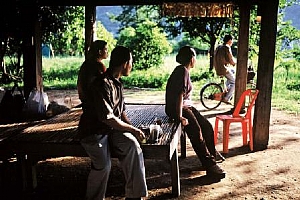Well, the festival is over. I’ve reported most of the interesting films I managed to catch at the festival (no doubt there were many more I missed, as is the nature of a film festival). Below, are some odds and ends –four films I saw in the last couple of days of the festival. Three of them are new, one a classic (the first three are in English –from the U.S., Canada and England, respectively- and the last is in Thai).
In ‘The Kids Are All Right’, Jullianne Moore and Annette Benning play Jules and Nic, a happily married lesbian couple with two teenaged kids- Joni (Mia Wasikowska) and Laser (Josh Hutcherson). When Joni turns 18, she agrees to Laser’s request to find and talk to Paul (Mark Ruffalo) who, when he was 19, donated the sperm that allowed them to be conceived. The late entrance of this father (and possibly husband) figure into the life of this family wreaks havoc on the idyll Jules and Nic were living in. This film tries to be two things. First – a nice film about five people whose lives are thrown into a whirlwind. Second, a film affirming the utter normality of a same-sex couple raising kids who Are All Right. In this latter category, it certainly succeeds. Paul’s entrance does throw all kinds of questions that Nic and Jules thought they were past -the film does not say that same-sex couples can exist without some complications (like the need for the other sex in order to have biological children)- but they will not be thwarted by these complications. As an actual piece of storytelling, however, I found the film to be on much shakier ground.
Throughout the film, I could not shake the sense that it felt a bit sitcom-ish. Benning and Moore are wonderful actresses, both fearlessly committed to looking good for their age, as opposed to looking young for their age. But both their characters strike me as being types, rather than characters. Or, more accurately- they both act according to a type. Benning is the bread-bringer, who wants structure and things to remain the same. Moore is the hippie, all love and support and emotion. And every single thing they do throughout this movie aligns exactly with those types. I never felt that the script allowed them to transcend the type- like a sitcom, they were in constant loop, never breaking out of the mold. I was far more interested in Joni and Laser- but their parts diminish in the second act…their conflict might have broken the mold, but instead, they also remain types. Ruffalo is the only one allowed to somewhat break out of the type. His easy-going, comfortable and confident Paul shows sides of himself that one would not necessarily expect. But he is disposed of rather coldly, to make way for an ever so tidy and “mature” ending, with everyone having gone through some stuff, but The Kids Will Be All Right. All it took was the director disposing of the only character that really came to life.
Ultimately, this film, which appeared to be a post-stigma film- that is, a film where a same-sex couple is just a couple, and the family is just a family- left a taste in my mouth of being the tale of the married lesbians, trying to convince me that they’re just another dysfunctional couple. I was already convinced. Director Lisa Cholodenko does her own story (she is also raising children with her wife) a disservice by preaching instead of proving by example. The film is pleasant enough for its likable actors in open, likable performances, but its script (co-written by Cholodenko and Stuart Bloomberg) just isn’t good enough.
‘The Trotsky’ is a delightful Canadian comedy, a rare high-concept comedy that manages to totally devote itself to its ridiculous concept, rarely taking a wrong step. It is a slight yet extremely enjoyable treat. Its concept is simple: 17 year old Leon Bronstein (Jay Baruchel from ‘Knocked Up’ and ‘Tropic Thunder’) is convinced that he is the reincarnation of the Leon Bronstein- better known as Leon Trotsky. Leon charts his future following Trotsky’s biography- from being imprisoned to marrying an older woman named Alexandra to meeting his own Lenin and Stalin to being assassinated in Mexico by ice pick. After failed attempts at revolution at his fascist father’s company, Leon takes his fight to a Montreal public school, which is suffering under the oppressive regime of Mr. Berkhoff (played with brio by wonderful Canadian actor Colm Feore), while trying to woo his own Alexandra (Emily Hampshire), who is not sure whether Leon is a charming idealist or a stalker. Writer/director Jacob Tierny puts together a good cast and sticks to his story -and in the process, creates the most charming high-school comedy in years. Baruchel succeeds in his first lead role, never too goofy for us to pity or too serious for us to worry for. This film succeeds by setting its sights on a goal and seeing it through to its logical conclusion- with Trotsky meeting Lenin.
As it did in recent years, the festival showcased screenings of a restored print of a classic film. Last year, they showed a magnificent print of Max Ophuls’ ‘Lola Montez’, which I was unfamiliar with at the time. This year, the festival showed Michael Powell and Emeric Pressburger’s ‘The Red Shoes’ (1949), one of the most glorious Technicolor films ever. The film is about a dancer (Moira Shearer), who must choose between her art (represented by the director of her ballet company, played by Anton Walbrook) and her love (the company’s composer, played by Marius Goring). Of the many splendors of this movie –it’s luscious colors, its breathtaking dance centerpiece, and Shearer’s performance- none impressed more this time around than the performance of Anton Walbrook as the company’s impresario. Walbrook –who, incidentally, was also in ‘Lola Montez’- gives what is in my opinion one of the absolute greatest screen performances of all time in this film. The Cinematheque tends to show these new prints in the months after the festival, and ‘The Red Shoes’ is one of films movie theaters were invented for (Something that can be said for the remarkable collaboration of Powell and Pressburger as a whole).
If you think that a title like ‘Uncle Boonmee Who Can Recall His Past Lives’ is a mouthful, just try to get your tongue around its director’s name. The illustriously named Apichatpong Weerasethakul, who prefers to be called Jo (no joke), has been making waves with films made in his native Thailand, including ‘Tropical Malady’ (2004) and ‘Syndromes and a Century’ (2006). I’d heard of these films, but had not gotten around to see them, when ‘Uncle Boonmee’, his latest film, won the Palm D’Or at this past Cannes film festival. I did not make the time to see his previous work before seeing his latest film on the last day of the Jerusalem festival, which I sorely regret now. Because this radical and hypnotic film came from left field. It is both grounded and abstract, tonally insane yet entirely of a piece, meandering and mesmerising. There are all kinds of connections one can make to other films and filmmakers -Mallick, Godard, Chris Marker- and its overall spiritual construct, of a dying man exploring the concept of reincarnation, as well as past and present political strife in Thailand. There is a fearsome intelligence behind this film- there is no sense of timid surrealism. Its most extreme imagery -be it an ape-man or one of the strangest and most striking scene of copulation I’ve seen- is contrasted with mundane and relatable scenes of a Buddhist monk complaining about the lack of a computer in his monastery. It is utterly bewildering, utterly hypnotic, and utterly convincing…though it is beyond me to articulate what exactly I was convinced of, aside from the figure of a towering filmmaker, one whose work I am sure is well worth the time to delve into. I look forward to it.










I watched ‘Tropical Malady’ and ‘Syndromes and a Century’ by Apichatpong Weerasethakul, both I think were in preparation for “Uncle Boonmee Who Can Recall His Past Lives’, which well deserved the Palm D’ Or.
Keep an eye on this film maker, he’ll be the next Lynch.
Comments are closed.